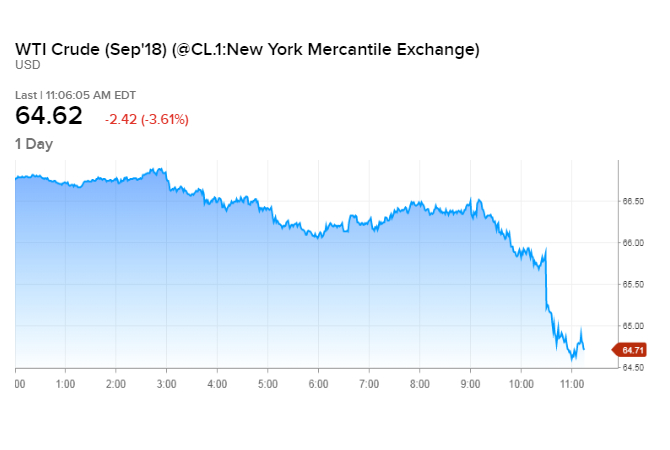Oil prices plunged on Wednesday after government data showed a big, unexpected jump in stockpiles of U.S. crude, compounding pressure as the outlook for global economic growth darkened and the stock market slumped.
U.S. light crude ended Wednesday's session down $2.03 a barrel, or 3 percent, at $65.01, it's lowest closing prices since June 6. The contract hit an eight-week intraday low at $64.51.
Global benchmark Brent crude oil fell $1.68, or 2.3 percent, at $70.78 by 2:26 p.m. ET, after hitting a four-month low at $70.30.

U.S. commercial crude inventories rose by 6.8 million barrels in the week through Aug. 10, the Energy Information Administration reported. Analysts in a Reuters poll had forecast stockpiles would fall by 2.5 million barrels.
The jump in stocks occurred as the nation's crude imports surged by 1 million barrels a day, while its exports fell by more than 250,000 bpd. That offset record activity at American refineries, which ran at 98 percent capacity.
"The imports of crude oil are just remarkable," said John Kilduff, founding partner at energy hedge fund Again Capital. "That we were able to build that much crude oil in inventory in the face of a 98 percent refinery run rate speaks volumes about the burst of supply that hit the market last week."
Stocks at the closely watched U.S. delivery hub at Cushing, Oklahoma rose by 1.6 million barrels. The East and West coasts both saw inventory levels jump by more than 2 million barrels.
Stockpiles of gasoline were down slightly more than expected, while inventories of distillate fuels, including diesel and home heating fuel, rose by 3.6 million barrels, more than three times the increase projected in the Reuters poll.
Losses in the oil market had already accelerated prior to the release of the weekly data as the Dow Jones Industrial Average fell as much as 334 points, driven by a sell-off in industrial metals, a slump in tech stocks and lingering concerns around Turkey's economic crisis.
An ongoing trade dispute between the United States and China also continues to feed concerns that global economic growth will slow and ultimately shrink demand for oil.
The OECD's composite leading indicator, which covers the western advanced economies plus China, India, Russia, Brazil, Indonesia and South Africa, peaked in January but has since fallen and slipped below trend in May and June.
World trade volume growth also peaked in January at almost 5.7 percent year-on-year, but nearly halved to less than 3 percent by May, according to the Netherlands Bureau for Economic Policy Analysis.
Chinese oil importers now appear to be shying away from buying U.S. crude oil as they fear Beijing may decide to add the commodity to its tariff list.
Not a single tanker has loaded crude oil from the United States bound for China since the start of August, Thomson Reuters Eikon ship tracking data showed, compared with about 300,000 barrels per day (bpd) in June and July.
Source: CNBC
